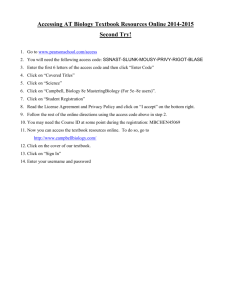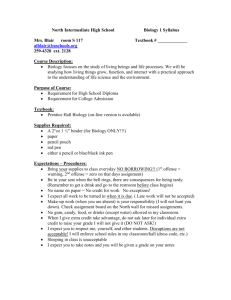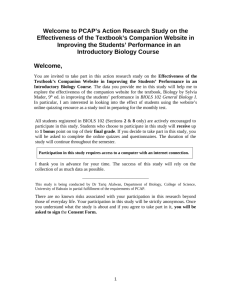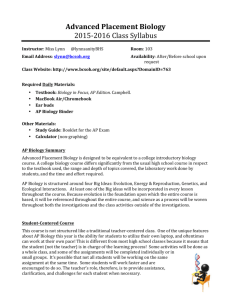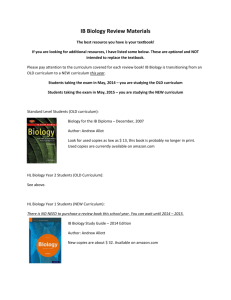AP Biology Syllabus
advertisement
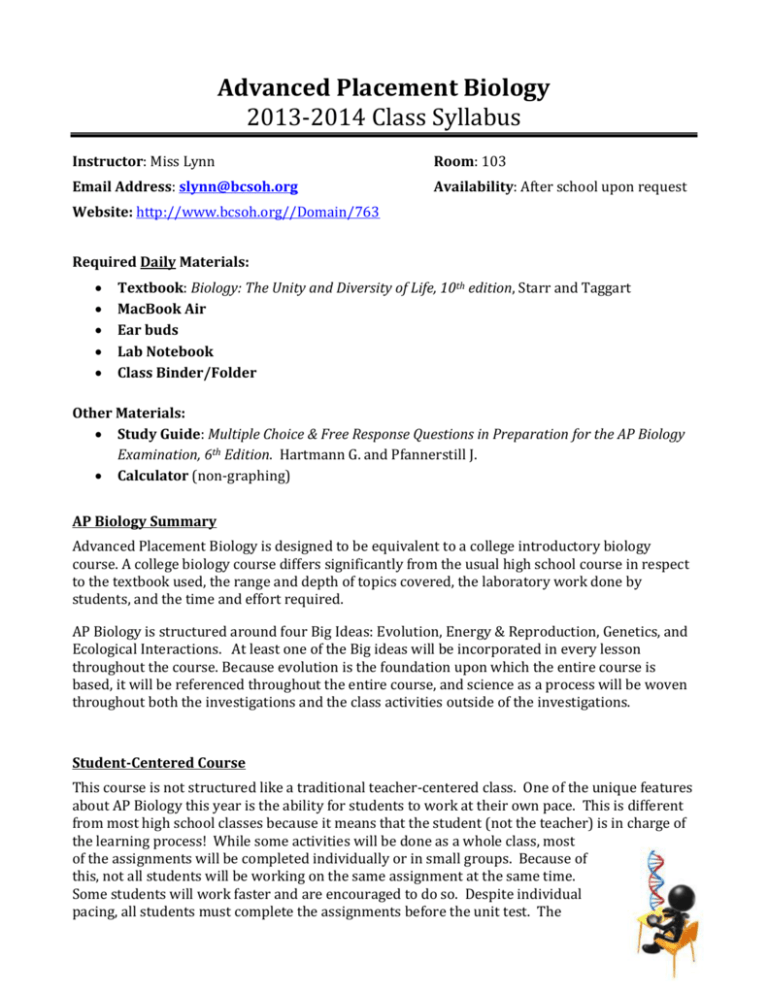
Advanced Placement Biology 2013-2014 Class Syllabus Instructor: Miss Lynn Room: 103 Email Address: slynn@bcsoh.org Availability: After school upon request Website: http://www.bcsoh.org//Domain/763 Required Daily Materials: Textbook: Biology: The Unity and Diversity of Life, 10th edition, Starr and Taggart MacBook Air Ear buds Lab Notebook Class Binder/Folder Other Materials: Study Guide: Multiple Choice & Free Response Questions in Preparation for the AP Biology Examination, 6th Edition. Hartmann G. and Pfannerstill J. Calculator (non-graphing) AP Biology Summary Advanced Placement Biology is designed to be equivalent to a college introductory biology course. A college biology course differs significantly from the usual high school course in respect to the textbook used, the range and depth of topics covered, the laboratory work done by students, and the time and effort required. AP Biology is structured around four Big Ideas: Evolution, Energy & Reproduction, Genetics, and Ecological Interactions. At least one of the Big ideas will be incorporated in every lesson throughout the course. Because evolution is the foundation upon which the entire course is based, it will be referenced throughout the entire course, and science as a process will be woven throughout both the investigations and the class activities outside of the investigations. Student-Centered Course This course is not structured like a traditional teacher-centered class. One of the unique features about AP Biology this year is the ability for students to work at their own pace. This is different from most high school classes because it means that the student (not the teacher) is in charge of the learning process! While some activities will be done as a whole class, most of the assignments will be completed individually or in small groups. Because of this, not all students will be working on the same assignment at the same time. Some students will work faster and are encouraged to do so. Despite individual pacing, all students must complete the assignments before the unit test. The teacher’s role, therefore, is to provide assistance, clarification, and challenges for each student when necessary. Assignment Types Assignments are uploaded to the class website prior to beginning each unit. Students are responsible for completing all activities before the unit test. Assignment types include video lectures, textbook readings, concept checks, labs (both real & virtual), case study readings, activities and quizzes. Always check the calendar block on the website to view the dates for upcoming tests. Video Lectures: Class time will not be used for whole-class lectures. Students will be responsible for watching instructional videos during class or at home on their MacBooks. These videos will be used to help explain the concepts covered by the textbook reading. Textbook Readings: Students must read the assigned chapter readings for each unit. These may be done before or after the video lectures. * It is my suggestion for all students to TAKE NOTES on video lectures and textbook readings in a notebook or binder, and make sure those are brought to class every day! Concept Checks: A series of multiple choice questions will be used to monitor each student’s understanding of the material covered in both the video lectures and textbook readings. Students will have two attempts to obtain the highest score possible (questions are randomized at the beginning of each attempt). Labs: Many hands-on labs will be conducted this year. Labs will be done on a whole-class basis or in small groups depending on the nature of the lab and the pace of individual students. Virtual labs will also be conducted by individual students when materials are not available or time is limited. Case Studies: Students will be asked to read / respond to many case studies and professional articles during the course of the year. These readings are intended to extend the basic concepts by applying them to real-world situations. Quizzes: Students will take online quizzes after successfully completing the assignments in each section. Students will be give two attempts to receive a score of 80% or better. Unit quizzes must be taken during class time. Unit Tests: All students will take a paper-based test on the same day at the completion of each unit. The typical format of tests will be short answer / essay and there are no retakes. Any assignment listed on Moodle not completed by test day will be recorded as a “0”. Student Expectations I expect that every student will: 1. Come to class prepared and ready to learn! 2. Use technology for educational purposes only. Using personal or school technology for non-educational purposes may result in the loss of this privilege. 3. Use the entire class period for AP Biology. Do your other homework…at home! 4. Treat themselves, their teacher, and each other with kindness & respect. 5. 6. 7. 8. Keep all food and drink away from the lab tables. Use integrity by not cheating, copying, or plagiarizing another person’s work. Openly discuss ideas and questions with the teacher and fellow classmates. Prepare in advance for the AP Biology exam on Monday, May 12. Lab Activities The laboratory activities in AP biology abandon the traditional teacher-directed content coverage model in favor of one that focuses on student-directed experimentation and inquiry. This approach enables students to identify the questions they want to answer, design experiments to test hypotheses, conduct investigations, analyze data, and communicate their results. As a result, they are able to concentrate on understanding concepts and developing the reasoning skills essential to the practices used in the study of biology. In inquiry-based laboratory investigations, students model the behavior of scientists by discovering knowledge for themselves as they observe and explore. By their very nature, such investigations are more difficult and take longer to conduct, but the successful completion of such labs lead to a better comprehension of the content as well as a deeper appreciation for the scientific process. Study Sessions Students in AP Biology are encouraged to form study groups and to assist each other with learning the course materials. These study groups can be held at during class time, at lunch, someone’s house or a public place like the library. During these sessions you and your group members can review/talk about the concepts from class, predict test questions and quiz each other, as well as help one another better understand difficult concepts. There will also be regularly scheduled after school study sessions in Miss Lynn’s room - especially as the date approaches for the AP exam. Parents It is important that parents and students read through the syllabus together. For your student to be successful, they must understand the policies and procedures within this syllabus. If you have any questions or concerns throughout the year, please feel free to contact me. The quickest method is via e-mail. I check my email during the school day, and will make every effort to get back to you within 24 hours during the school week. Grading: Final grades will be replaced with the designation “credit/no credit" on report cards and transcripts on credit-bearing courses. Because GPA is calculated from semester grades, it has no effect on students. For each semester course, credit will be awarded when the student has earned BOTH a passing GPA for the course (on the scale above) and two passing grades for the semester. Semester course GPA calculation: Q1 or Q3 (40%) + Q2 or Q4 (40%) + Exam (20%) For each full-year course, credit will be awarded when the student has earned BOTH a passing GPA for the course (on the scale above) and two passing grades in the second semester. Full-year course GPA calculation: Q1 (20%) + Q2 (20%) + Exam1 (10%) + Q3 (20%) + Q4 (20%) + Exam2 (10%) 90/10: BHS uses 90/10 grading to plan assessments and calculate grades in all classes. This policy assures that 90% of each report card grade reflects students’ mastery of the subject matter with 10% being allowed for assessment of students’ work habits. Traditionally, this ratio has been determined by each individual teacher. This approach to grading causes grades to have a more common, consistent meaning across subjects and grades levels, which increases their usefulness as tools for understanding students’ learning, intervening appropriately and communicating with parents. This syllabus reflects 90/10 guidelines. The Bottom Line In my classroom, I expect you to work as hard as you can, be respectful of yourself & others, and have fun time learning about biology. In return, I will do the same and make sure everyone in this class has the opportunity to succeed. Get ready for an amazing year!
